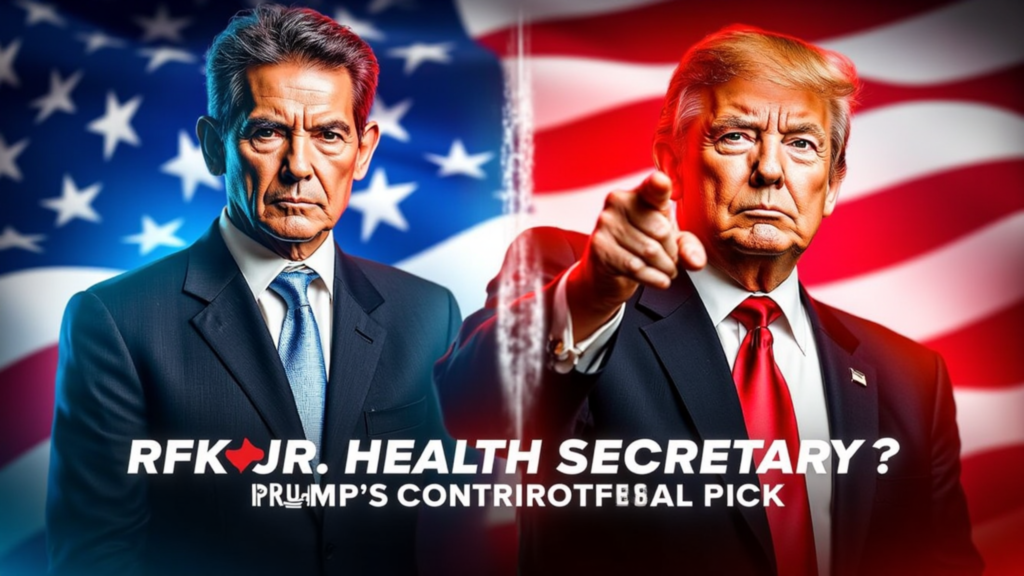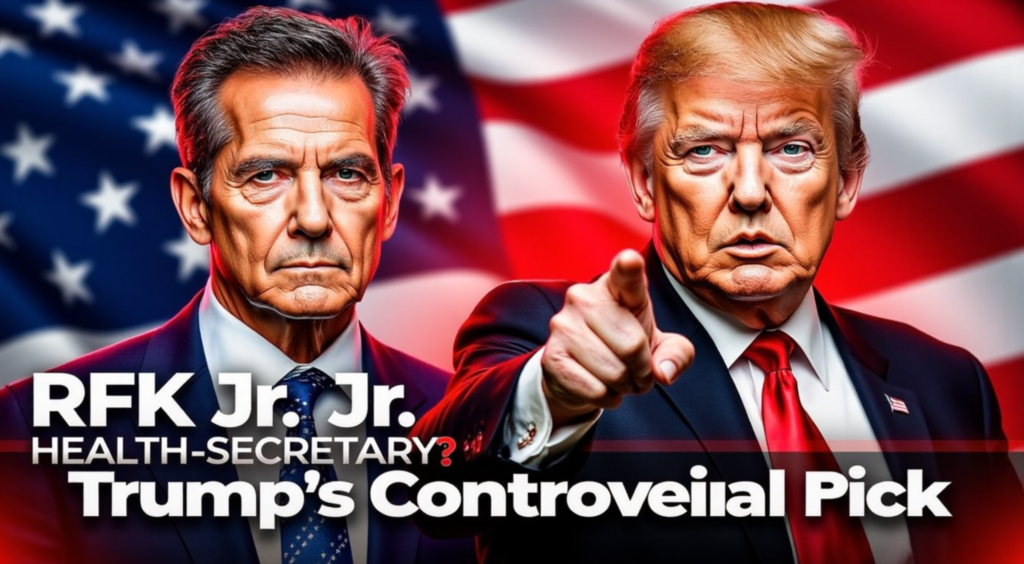For one, former President Donald Trump yesterday announced that he would appoint RFK Jr. to Serve as Health Secretary Under Trump’s Leadership”, an outspoken vaccine skeptic and environment advocate, as his Health Secretary if he becomes president again in 2024. Being a long-time vocal critic of vaccines, the environment, and public health, Robert F. Kennedy Jr has been at the heart and problem of American politics for years. An appointment would rather be a landmark change in the direction of U.S. healthcare policy and in the way health problems are treated across the nation.
Who is RFK Jr?
Besides being the lawyer and an environmental activist, Robert F. Kennedy Jr., is also the son of the late U.S. Senator, Robert F. Kennedy. He was a nephew of former President John F. Kennedy. His name had been talked about in American politics and public life for several decades. His career spanned across many genres, but his criticism over vaccines made him most verbal and, therefore notorious.
He is a well-known vaccine critic, specifically childhood vaccines and gained huge popularity by publishing a sequel on interested ingredients and the side effects of vaccines. His stand on vaccines has been considerably rebuked by the science and medicine professions where several experts refer to him as the icon of the “anti-vaccine” movement.
Yet RFK Jr. has had a bully pulpit-often using celebrity and family name to shout from the rooftops.
Besides his skepticism about vaccines, Kennedy has proven an energetic champion of the environment, special emphasis on battling pollution and corporate corruption.
A leader in the nongovernmental organization Children’s Health Defense, RFK Jr. has widely advocated on everything from water and air quality issues to problems related to consumer product safety. Advocating for the environment has brought him praise and applause while his views on vaccines have become all-consuming.

The Troubling Figure
An appointment of RFK Jr as Health Secretary if Trump is going to win a second term in the 2024 election would be too shocking, given the depth into which divisions in US politics on vaccines, public health, and health-care reform have been entrenched. Much tension associated with public health issues was seen during Trump’s first term when he was condemned over health and safety guidelines in the COVID-19 pandemic.
However, the Kennedy appointment may be the biggest change in the Trump administration’s approach on public health policy. Assuming things equal, criticism of vaccine mandates and mistrust over the U.S. Centers for Disease Control and Prevention (CDC) and the Food and Drug Administration (FDA) by RFK Jr. would likely shift Trump’s line on a vaccine policy as well as general healthcare reform.
For many of Kennedy’s supporters, his confirmation would symbolize yet another victory in the fight for individual rights and personal liberties — first of all when considering mandates to receive vaccines and the interference of governments in health undertakings at large.
Those who support the change argue that the direction sought to be applied through such changes would set the industry right back on track since Kennedy promised more battles against pharmaceutical and more open healthcare policies in an industry where they seem to have grown too cozy with corporate might.
But an anti-vaccine crusader such as RFK Jr to preside over a Cabinet department charged with protecting vaccine safety could poison public confidence in the very vaccines which, throughout history, have invariably proven safe and effective in protecting Americans against some of man’s deadliest diseases.
Impact of the Problem on U.S. Health Policy If RFK Jr. were to be the Health Secretary of the United States, many changes would probably be made in U.S. health policy across vaccine safety, health reforms, and pharmaceutical regulation, among other things. Some of the possible resultant facts are:
- Regulatory reforms in the immunization policy
One who can plead as adamant anti-vaccine advocate against the safety of vaccines and mandates is RFK Jr, who can plead for a more cautious approach at the development and distribution of vaccines, most of which may involve reevaluating some of the policies on vaccines in schools, workplaces, and in public places. RFK Jr has mainly pointed to questions about vaccine composition and the extended safety but is also advocating for stricter testing before their introduction to the people, asking for greater openness while conducting vaccine researches.
This would certainly cause a grave controversy from the agencies and President Donald Trump who might identify with such a bad perception of vaccines since most scientists and health practitioners will continue to advance further and advocate for vaccines as a prevention tool against diseases. From public health experts, such an event may derail the years of good success in the eradication of preventable diseases due to misinformation and mistrust.
2. Focus on Environmental Health Since RFK Jr. is well known in environmental concerns, such aspects related to health would shoot up during his tenure as a Health Secretary. Since he was fighting for clear air and water and forcing food safety, he was strengthening activities on issues pertaining to pollution, climate change, and their impacts upon public health.
Strong environmental lawyer, Kennedy is still a vigorous advocate for stricter rules that would ensure children are free from harmful chemicals and toxins.
We might be reading about new policies and how climate change starts affecting public health alongside rising cases of asthma, heart diseases, etc., in place because of environmental toxins if RFK Jr. centers more focus on the health of the environment.
3. Influence of Big Pharma RFK Jr. has long targeted the stronghold of the pharmaceutical industry on the crafting of healthcare policy, particularly as it relates to vaccines, and the seeming conflict that exists between drug manufacturers and the agencies charged with regulating them.
By his own appointment, the U.S. Department of Health and Human Services may be more aggressive in forcing pharmaceutical industries to be candid and come clean over issues of drugs’ pricing, marketing, and even safety testing.
It could also lead to a further reevaluation of what the role of public health agencies, such as the FDA, is versus the pharmaceutical industry, maybe with more severe regulations and even drug review to satisfy its approved market use. Public Reaction and Political FalloutThat would set off huge political furore – Kennedy becomes the new Heath Secretary.
It would probably be very polarized, and supporters of Trump and RFK Jr. would even call it an audacious step toward a free, liberated, and more transparent health policy.
Those same public health advocates and pro-vaccine voices likely would be scolding that visit as a dangerous step back, one that could put perhaps millions of Americans at risk by shattering trust in the medical establishment and its guidance on public health.
There’s also the kind of line of argument around RFK Jr.’s appointment for Trump’s campaign in 2024 too. Some will believe it suggests that Trump is willing to break with history and do something that might best be described as unorthodox. Others will regard this as yet another example of the way in which Trump approaches the game of politics.
Conclusion
Interesting, and perhaps controversial, is the development of installing Robert F. Kennedy Jr. as Health Secretary under Donald Trump. This would be a total shift away from previous health policy and focus on personal rights, environmental health, and further vaccination scepticism by the pharmaceutical industry.
Time will only tell whether or not this shift will benefit or hinder public health in America, but undoubtedly RFK Jr.’s ascension to this position will powerfully change the current health care landscape that already exists. That is also a topic that will dominate “health care talk” vis-à-vis science and public policy in America during the approach to the 2024 election cycle.




Good